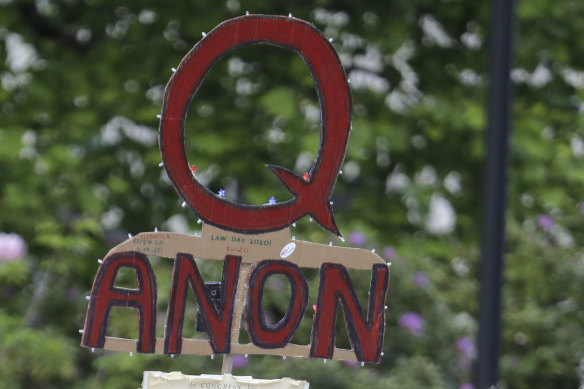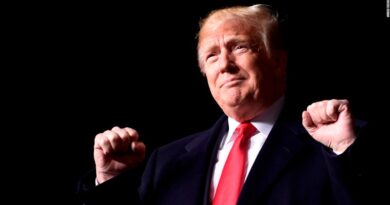I thought we’d be friends forever – then came the conspiracy theories
We all seem to have someone in our lives who has fallen down the conspiracy rabbit hole. For some, it’s the weird uncle they only see at Christmas who believes 5G is a weapon used by the government to control our minds. For others, it’s the co-worker who reveals, after a few beers at Friday drinks, their unwavering belief that the moon landing was fake.
For me, it was my childhood best friends: the two people with whom I’d grown up, shared the same dull suburban upbringing, navigated puberty, endured crappy hospitality jobs and experienced first boyfriends – and break-ups. The two people I never in a million years expected to adopt beliefs so shockingly opposing to my own that we could no longer reconcile our ideological differences.
But it didn’t happen overnight.

One of the more popular conspiracy theories had it that 5G mobile towers caused COVID-19. Credit: Getty Images
It all started with crystals, Tarot and astrology. Now, let me preface this by saying these things aren’t necessarily precursors to the adoption of outlandish conspiracy theories. I’ll be the first to put my hand up and say I thoroughly enjoy guessing people’s star signs and reading my horoscope online (provided it’s positive, otherwise I don’t want to hear it).
However, what began as your classic new-age spiritualism evolved into something darker than daisy chains and magic mushrooms. At the height of the pandemic, my two best friends, Emma* and Naomi*, began “doing their own research” about the vaccine only to come to the conclusion that it was a total hoax orchestrated by the government.
And this wasn’t the only conspiracy theory Emma and Naomi held. In their pokey share house filled with plumes of weed and incense smoke, they told me about global paedophile rings led by prominent celebrities in the same way one talks about the weather. They performed at-home, past-life regressions and stopped seeing their psychologists in favour of a kinesiologist who promised to heal their trauma with the touch of a finger. Over a number of expensive sessions, of course.
I was truly dumbfounded. These were intelligent, kind people. We used to have intellectual debates about politics and laugh at how cynical we all were. How were we suddenly arguing about whether or not the government had decided to hatch a devious plot to limit our freedoms and force us to take a vaccine that causes heart attacks, despite this being the very same government that fails to complete major roadworks on time?
As it turns out, this unlikely coupling of woo-woo wellness practices and alt-right beliefs is neither new nor uncommon. In 2011, sociologists Charlotte Ward and David Voas came up with the term “conspirituality” to describe “a rapidly growing web movement expressing an ideology fuelled by political disillusionment and the popularity of alternative worldviews”.
But it’s not just crystal-wearing yogis who can fall down the conspiracy theory rabbit hole. People from all walks of life and all tax brackets have peered too close and fallen head-first.
So, how is it that well-educated people are not only entertaining the idea of conspiracy theories but believing them?

Many QAnon followers believe the 2020 US election result was rigged against Donald Trump. Credit: AP
Dr Joanne Gray, a researcher and lecturer in media and communications at the University of Sydney, says there are a number of factors behind the spread of conspiracy theories online. Namely, a lack of trust in institutions and governments, and our tendency to overestimate our ability to assess whether something is true or not. What is new in terms of human history is the internet and social media, which have allowed misinformation to be spread instantaneously across the world, at scale.
“What we see is these platforms that provide global dissemination that we’ve not had before, and then they’re also designed in ways that encourage what’s called the bandwagon effect,” Gray explains. The premise is that when we see a post with strong engagement, be it in the form of likes or shares, we’re more likely to subconsciously perceive it as more credible, even if it isn’t.
Gray also notes that the less well-moderated a social media space is, the more misinformation and harmful content you can expect to see. One only needs to open X, formerly Twitter, to see that the absence of sufficient content moderation provides fertile soil for conspiracy theories to grow.
There’s also research to suggest that some people are simply more susceptible to believing conspiracy theories than others. According to the American Psychological Association, those who believe in conspiracy theories are more likely to be eccentric, impulsive and emotionally volatile, and are often motivated by a need to understand and feel safe in their environment.
Looking back now, I’m no longer shocked or confused by Emma and Naomi’s trip down the rabbit hole. We were all navigating life in a period of heightened uncertainty. Institutions had let them down in the past. And, boy, were they smoking a lot of weed.
With the benefit of hindsight, I can also see exactly how my dismissive response only served to push the wedge in our friendship deeper. At times, my desire to disprove their theories outweighed my desire to understand why they believed them in the first place. Maybe if I had tried to understand, I would have been able to see them as two vulnerable people who were presented with an alarming yet comforting explanation for the chaos and injustice of the world.
I used to wonder, could I have saved our friendship? Could I have convinced them to abandon their wacky beliefs? The short answer is no – because the long answer involves going back years before the breakdown of our friendship, and long before QAnon even entered the picture. Our lives were splintering off in vastly different directions and, in the end, the conspiracy theories were just proof that we’d grown too far apart. And that’s OK.
* Names have been changed.
Grace Flynn is a freelance writer.


